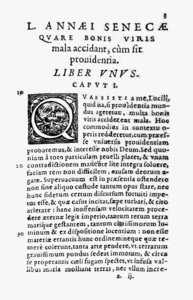What does de providentia mean?
Definitions for de providentia
de prov·i·den·ti·a
This dictionary definitions page includes all the possible meanings, example usage and translations of the word de providentia.
Wikipedia
De Providentia
De Providentia (On Providence) is a short essay in the form of a dialogue in six brief sections, written by the Latin philosopher Seneca (died AD 65) in the last years of his life. He chose the dialogue form (as in the well-known Plato's works) to deal with the problem of the co-existence of the Stoic design of providence with the evil in the world—the so-called "problem of evil."
Wikidata
De Providentia
De Providentia is a short essay in the form of a dialogue in six brief sections, written by the Latin philosopher Lucius Annaeus Seneca, "Seneca the Younger" in the last years of his life. He chose the dialogue form to deal with the problem of the co-existence of the Stoic design of providence with the evil in the world. The dialogue is opened by Lucilius complaining with his friend Seneca that adversities and misfortunes can happen to good men too. How can this fit with the goodness connected with the design of providence? Seneca answers according to the Stoic point of view. Nothing actually bad can happen to the good men because opposites don't mix. What looks like adversity is in fact a means by which the man exerts his virtues. As such, he can come out of the ordeal stronger than before. So, in perfect harmony with the Stoic philosophy, Seneca explains that the truly wise man can never surrender in the face of misfortunes but as he will always go through them and even if he should fall he will continue fighting on his knees. The wise man understands destiny and its design, and therefore he has nothing to fear from the future. Neither does he hope for anything, because he already has everything he needs - his good behaviour.
Numerology
Chaldean Numerology
The numerical value of de providentia in Chaldean Numerology is: 8
Pythagorean Numerology
The numerical value of de providentia in Pythagorean Numerology is: 7
Translation
Find a translation for the de providentia definition in other languages:
Select another language:
- - Select -
- 简体中文 (Chinese - Simplified)
- 繁體中文 (Chinese - Traditional)
- Español (Spanish)
- Esperanto (Esperanto)
- 日本語 (Japanese)
- Português (Portuguese)
- Deutsch (German)
- العربية (Arabic)
- Français (French)
- Русский (Russian)
- ಕನ್ನಡ (Kannada)
- 한국어 (Korean)
- עברית (Hebrew)
- Gaeilge (Irish)
- Українська (Ukrainian)
- اردو (Urdu)
- Magyar (Hungarian)
- मानक हिन्दी (Hindi)
- Indonesia (Indonesian)
- Italiano (Italian)
- தமிழ் (Tamil)
- Türkçe (Turkish)
- తెలుగు (Telugu)
- ภาษาไทย (Thai)
- Tiếng Việt (Vietnamese)
- Čeština (Czech)
- Polski (Polish)
- Bahasa Indonesia (Indonesian)
- Românește (Romanian)
- Nederlands (Dutch)
- Ελληνικά (Greek)
- Latinum (Latin)
- Svenska (Swedish)
- Dansk (Danish)
- Suomi (Finnish)
- فارسی (Persian)
- ייִדיש (Yiddish)
- հայերեն (Armenian)
- Norsk (Norwegian)
- English (English)
Word of the Day
Would you like us to send you a FREE new word definition delivered to your inbox daily?
Citation
Use the citation below to add this definition to your bibliography:
Style:MLAChicagoAPA
"de providentia." Definitions.net. STANDS4 LLC, 2025. Web. 22 Feb. 2025. <https://www.definitions.net/definition/de+providentia>.







Discuss these de providentia definitions with the community:
Report Comment
We're doing our best to make sure our content is useful, accurate and safe.
If by any chance you spot an inappropriate comment while navigating through our website please use this form to let us know, and we'll take care of it shortly.
Attachment
You need to be logged in to favorite.
Log In